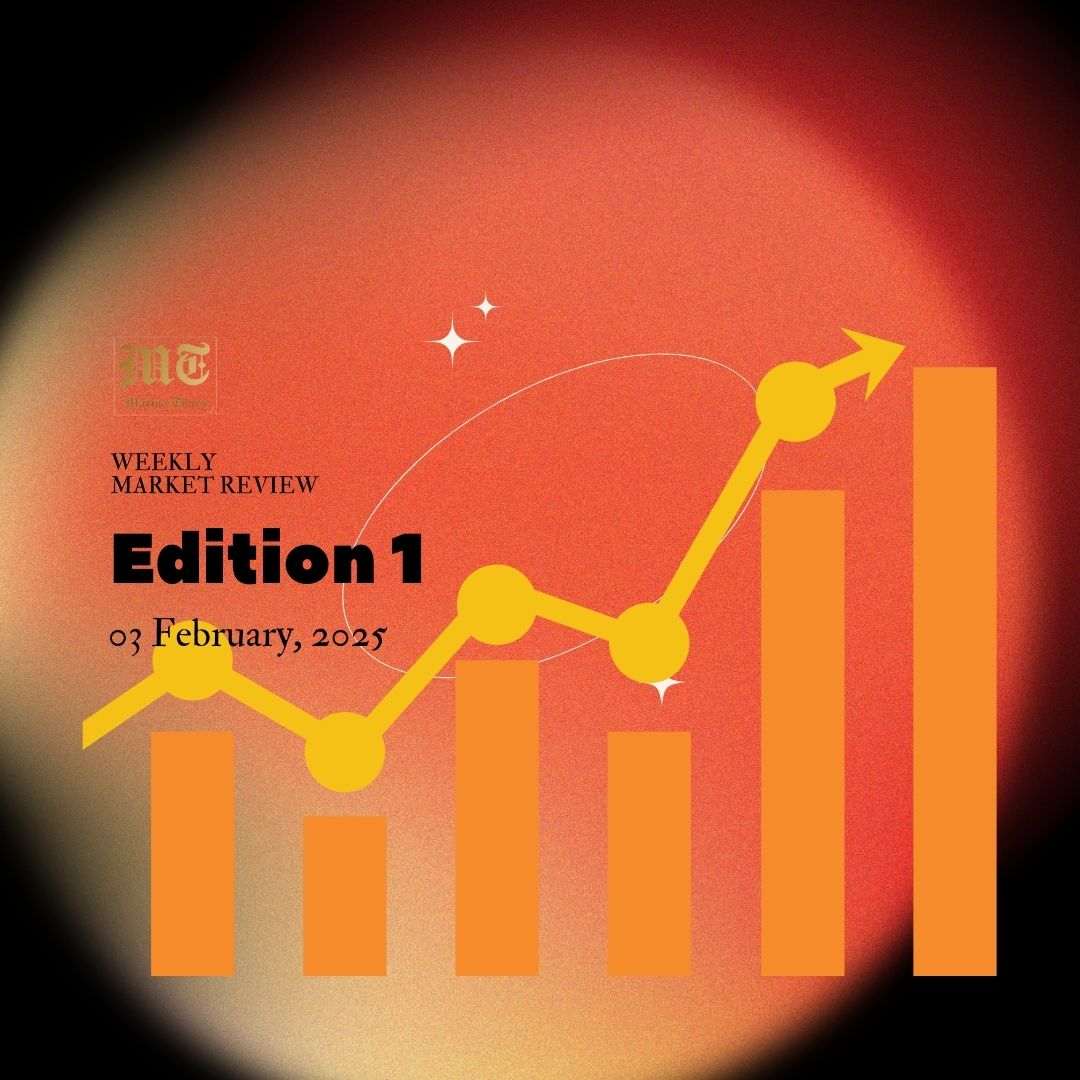

The Federal Government, through the Debt Management Office (DMO), conducted its first bond auction of the year on Monday, aiming to raise ₦450 billion—the total amount on offer for the three offered tenors. The funds raised will play a crucial role in financing capital projects outlined in the 2025 budget or paying existing debt. By securing funds through domestic borrowing, the government aims to manage its debt profile prudently, balancing between domestic and external debt to mitigate foreign exchange risks. However, the elevated marginal rates also suggest increased borrowing costs for the government, which could have long-term fiscal implications if not managed effectively.
The Central Bank of Nigeria (CBN) has taken a significant step towards enhancing the integrity and transparency of the Nigerian Foreign Exchange Market by introducing the Nigerian Foreign Exchange (FX) Code. The code was officially launched on 28th January 2025 at the CBN Head Office Auditorium in Abuja.
In the week under review, the Naira fluctuated between a high of $/₦1,538.00 on Tuesday and a low of $/₦1,440.00 on Friday, closing at $/₦1,475.00 on Friday. In the money market, liquidity surged to a surplus of over ₦720 billion, a sharp contrast to the previous week’s surplus of over ₦210 billion. However, short-term borrowing rates saw a notable uptick, with the O/N rate rising to 29.57% and OPR to 29.24%, up from the previous week’s 27.50% and 27.00%, respectively.
The bond auction for January saw a total subscription of ₦669.939 billion and an allotment of ₦606.455 billion, surpassing the initial target of ₦450 billion. The subscription rate represents a significant increase of approximately ₦459 billion compared to the amount allotted at the final auction for 2024. The stop rates for the 5-year and 7-year bonds increased by 65 basis points and 50 basis points, respectively. While the new 10-year bond had an initial opening rate of 22.60%, the 7-year bond (February 2031) has become the first Nigerian bond to cross over ₦2 trillion in volume since it was issued in 2024.
BONDS TENOR | APRIL 2029 | FEBRUARY 2031 | JANUARY 2035 |
AUCTION DATE | 27-01-2025 | 27-01-2025 | 27-01-2025 |
SETTLEMENT DATE | 29-01-2025 | 29-01-2025 | 29-01-2025 |
MATURITY DATE | 17-04-2029 | 21-02-2031 | 29-01-2035 |
TENORS | 5-YEAR | 7-YEAR | 10-YEAR |
AMOUNT OFFERED (₦) | 100 BILLION | 150 BILLION | 200 BILLION |
SUBSCRIPTION (₦) | 92.660 BILLION | 175.870 BILLION | 401.409 BILLION |
AMOUNT ALLOTTED (₦) | 78.859 BILLION | 159.287 BILLION | 368.309 BILLION |
STOP RATES (%) | 21.7900 | 22.5000 | 22.6000 |
PREVIOUS STOP RATES (%) | 21.1400 | 22.0000 | NIL |
The CBN sold a total of ₦1 trillion at the end of the OMO auction on Friday. Out of a total offer of ₦600 billion, subscriptions reached almost ₦3 trillion. Unlike previous auctions where the trend for the stop rates was around 23% – 24%, this auction brought back the stop rates to around mid-22 %. Specifically, there was a decline of 131 basis points and 119 basis points for the two tenors offered—when compared to the previous auction.
TENOR | AUCTION DATE | OFFER (₦’ B) | BIDS (₦’ B) | RANGE OF BIDS (%) | STOP RATES (%) | PREVIOUS STOP RATES (%) | TOTAL SALE (₦’ B) |
347-DAY | 31-01-2025 | 300.00 | 935.00 | 22.2200-23.3800 | 22.5000 | 23.8100 | 500.00 |
361-DAY | 31-01-2025 | 300.00 | 1,959.75 | 22.2500-23.4800 | 22.6500 | 23.8400 | 500.00 |
Open Market Operations (OMO) are a critical tool used by the Central Bank of Nigeria (CBN) to manage liquidity in the financial system. Traditionally, OMO bills have been accessible to both local banks and Foreign Portfolio Investors (FPIs).
In October 2019, the CBN restricted OMO sales to only banks and foreign investors, excluding local non-bank financial institutions and individuals. This move aimed to curb excess liquidity and control inflation, further fueling the debate about whether OMO sales should focus on banks or FPIs.
Some analysts have suggested that OMO sales could better bring the desired results when focused on FPIs, not banks. The suggestion to focus OMO sales strictly on offshore investors, rather than Nigerian banks, seems grounded in the current need to attract Foreign Exchange (FX) inflows into the country. Given the pressure on Nigeria’s FX reserves, targeting FPI for OMO sales could be seen as a tool to achieve that goal.
Essentially, any OMO sale that does not result in producing FX is not seen as particularly valuable in the current context. Selling to offshore investors brings in the much-needed FX, which could help stabilise the Naira and improve reserves.
Also, the fact that banks are mainly intermediaries in OMO sales—they buy from the CBN and then sell to customers (including FPIs)—the direct benefit to FX reserves from selling to them is less immediate compared to selling directly to foreign investors.
However, the decision to focus on FPIs also hinges on their risk appetite and market conditions. If foreign investors are eager for high-yielding instruments, targeting them might offer a better outcome in terms of FX inflows. On the flip side, selling only to offshore investors might put additional pressure on domestic liquidity, especially where local banks feel left out or where the broader banking sector struggles to manage liquidity as a result. Nonetheless, this may be seen as a trade-off that’s necessary for ensuring FX stability.
Given these factors, the logic behind focusing OMO sales on offshore investors appears solid, as it could directly contribute to FX inflows—an urgent priority for the CBN.
The CBN launched the FX Code which serves as a comprehensive guideline for authorised dealers, outlining best practices and promoting ethical conduct in foreign exchange transactions. Key objectives of the code include enhancing market transparency, promoting ethical conduct, and mitigating financial risks. In essence, by establishing clear standards, the code aims to ensure that all market participants have access to accurate and timely information, thereby reducing information asymmetry. Also, the code emphasises the importance of integrity, fairness, and professionalism among authorised dealers, thereby contributing to trust in the FX market.
Recall that the CBN recently introduced the EFEMS. The introduction of the FX Code is timely, considering the challenges faced in the Nigerian FX market, including currency fluctuations and irregular trading practices. By adhering to the guidelines, market participants can better manage risks associated with foreign exchange transactions, contributing to overall financial system stability. The CBN has mandated all FX market participants to conduct a self-assessment of their compliance with the FX Code and submit a report by 31st January 2025.
It is no news that Nigeria has been battling with persistent inflationary pressures, which have posed challenges to economic stability. In December 2024, the country’s inflation rate escalated to 34.8%, up from the 33.6% reported in November, marking one of the highest levels in recent decades. In response to the escalating inflationary pressures, both the IMF and the World Bank have called for a coordinated and steadfast approach to inflation control in Nigeria. They have emphasised the need for the CBN to maintain its efforts in implementing monetary policies aimed at curbing inflation.
The IMF and World Bank have outlined several strategies for Nigeria to effectively manage and reduce inflation. These include tightening monetary policy and urging the CBN to continue raising interest rates to reduce money supply and mitigate inflationary pressures. Also recommended was fiscal discipline, encouraging the Nigerian government to implement prudent fiscal policies such as reducing budget deficits and avoiding excessive borrowing, which could contribute to inflation.
However, the CBN acknowledged the concerns raised by the IMF and World Bank and reiterated its commitment to using all available tools to manage inflation. The CBN Governor, Mr. Olayemi Cardoso, has indicated that the bank is prepared to implement necessary measures to achieve price stability, including adjusting monetary policy instruments and enhancing foreign exchange management.
Despite these commitments, Nigeria faces several challenges in its fight against inflation. The IMF and World Bank have advocated for a coordinated approach to inflation control, emphasising that it requires a blend of short-term monetary and fiscal interventions alongside long-term structural reforms. Additionally, efforts must be made to enhance foreign exchange stability, build foreign exchange reserves, attract Foreign Direct Investment (FDI), and curb speculative activities that place unnecessary pressure on the Naira. Fiscal reforms and debt sustainability are also crucial, with the government needing to improve revenue generation through tax reforms, better collection mechanisms, and reducing leakages in public expenditure. Implementing measures to ensure debt sustainability will free up resources for investment in critical sectors that drive economic growth.
In the coming weeks, we expect to see a more neutral approach to tariff imposition by the US as more countries threaten retaliation. It is only a matter of time before global powers realise that the ultimate implication of recent tariffs is increased global inflation. With global and local actors pressing for a coordinated approach to controlling inflation, the CBN is under increased pressure to act decisively. Both the IMF and the World Bank have emphasised the need for a careful balance, which would involve tight monetary policies to curb inflation without stifling economic growth.
Cryptocurrencies are expected to be partially depressed at least until this tariff adjustment takes place. Oil prices on the other hand may inch up in the near term.
Also, the outlook for Nigeria centres on a delicate balancing act, especially as the first MPC meeting of the year is anticipated. The CBN will need to navigate these complex factors more carefully, keeping a close watch on inflation, exchange rates, and external economic pressures; however, many are hopeful that the FX Code and OMO strategies could provide some stabilisation.